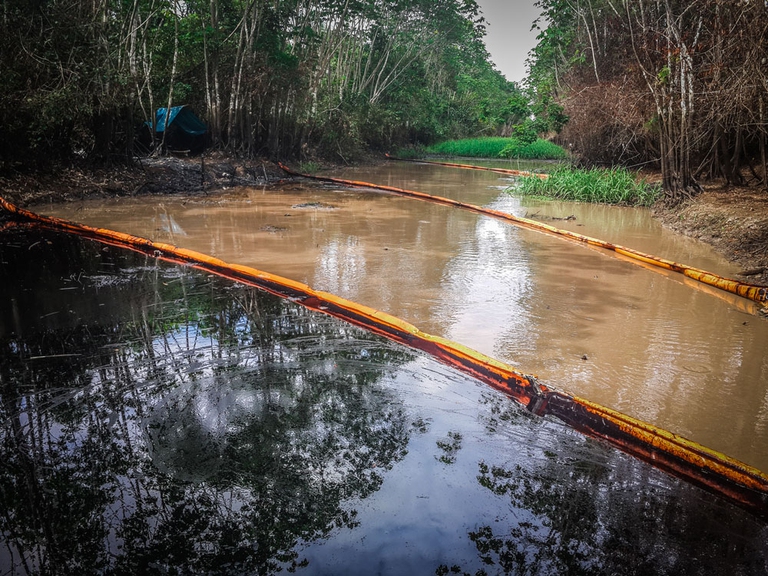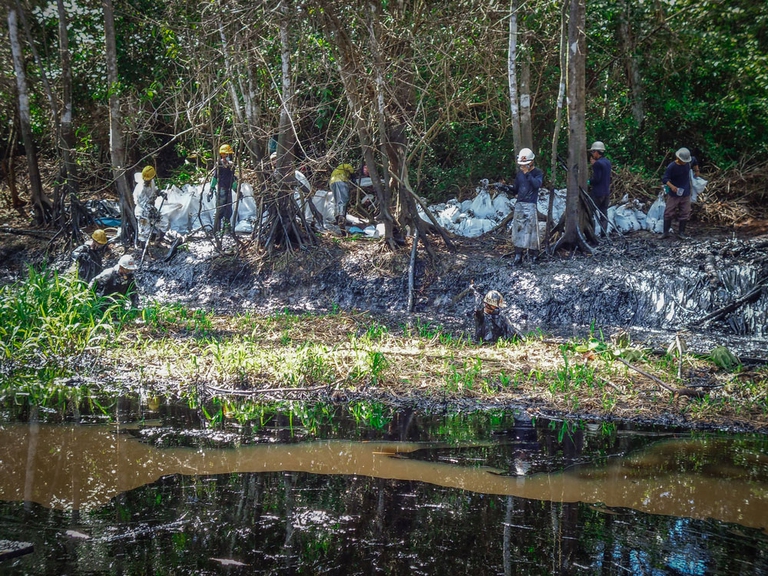
The United States will have to obey restrictions and won’t be able to expand oil exploration in the Arctic and Atlantic Oceans, against President Trump’s will.
Nell’oleodotto della compagnia petrolifera Petroperu si sono aperte due falle e il greggio sta contaminando il fiume Marañon, uno dei principali affluenti del Rio delle Amazzoni.
The Amazon River, which crosses some of the world’s most important areas rich in biodiversity, is turning black. In Peru, thousands of barrels of crude oil have been spilled into various waterways in the Amazonian region, causing an unprecedented environmental disaster in the country’s history.
The crude oil has leaked from the pipelines of Peruvian oil company Petro-Perú and contaminated the Marañon River, one of the main tributaries of the Amazon River. Two oil spills have been registered. The first one took place on 25 January and was caused by a landslide that would have damaged the pipelines. The second one occurred on 3 February but the causes are still unknown. Water, plants, animals, and cultivated lands are now covered with by a grim, black layer.
“Current conditions allow declare an environmental emergency in the Marañon basin, at the border with our reserve,” said Alfonso Lopez Tejada, representative of Kukama Kukamiria indigenous people. The company responsible for the disaster has claimed it has been working unrelentingly in order to contain the oil spill, despite the morphology of the area and adverse climate conditions make the cleaning operation harder.
Meanwhile, the Agency for Environmental Assessment and Enforcement (OEFA) is trying to assess the real environmental impact of the incident. About 8,000 people live in the affected area and rely on the rivers that have contaminated by the oil spill.
“Not only we must protect the Amazon forest, but also crops that have been affected,” said Minister for the Environment Manuel Pulgar. “The state-owned company has to be punished with the highest fine”.
The amount of the fine is still not clear, but some say Petroperu will face fines of 17 million dollars. The Peru oil spill took place just a few months after the Brazil dam disaster, where the collapse of two dams caused the spill of tonnes of toxic mud that irreparably contaminated the local ecosystems.
It’s the same old story: crumbling facilities, negligence, authorities’ support and finally fines, which are paid by oil giants without batting an eye. But those fines won’t ever be able to compensate the people, trees, plants, and all animals fallen victim of the disasters.
Siamo anche su WhatsApp. Segui il canale ufficiale LifeGate per restare aggiornata, aggiornato sulle ultime notizie e sulle nostre attività.
![]()
Quest'opera è distribuita con Licenza Creative Commons Attribuzione - Non commerciale - Non opere derivate 4.0 Internazionale.
The United States will have to obey restrictions and won’t be able to expand oil exploration in the Arctic and Atlantic Oceans, against President Trump’s will.
Oil isn’t attractive anymore. The coral reef and the ocean are worth more protecting instead. This is the historic decision made by Belize, small Central American country on the border with Mexico and Guatemala that has banned all future oil explorations within its territorial water in order to protect its great barrier reef. The Belize
These are the top news stories of 2017 and the people who have most left a mark on a year that has been intense yet also rewarding from the point of view of social and environmental sustainability.
After Pantelleria, Italy in 2014, the Republic of Malta in 2015, and Gran Canaria, Spain in 2016, this year the Italian island of Favignana, off the coast of Sicily, will host the fourth edition of the Greening the Islands International Conference on the 3rd and 4th of November. The event marks an important opportunity to tackle the topic of
On 23 October in Paris the mayors of London, Paris, Los Angeles, Copenhagen, Barcelona, Quito, Vancouver, Mexico City, Milan, Seattle, Auckland, and Cape Town committed to a series of ambitious targets to make their cities greener, healthier and more prosperous. By signing the C40 Fossil-Fuel-Free Streets Declaration, the pioneering city leaders pledged to procure only
The Canadian oil company Pacific E&P, who had been granted the right to explore and extract oil in the Peruvian Amazon by the national government, has halted its exploration activities in block 135 of the rainforest (which is divided into “blocks” of oil and gas exploration). The company released a statement saying it “has made the decision to relinquish its exploration
By Anne Hidalgo, Mayor of Paris Clover Moore, Lord Mayor of Sydney Yuriko Koike, Governor of Tokyo Patricia de Lille, Mayor of Cape Town The next four years will be crucial in determining if the world can avoid the worst impacts of climate change, keeping the global temperature rise to below 1.5 degrees. As the
People living near major roads and busy traffic are more at risk of developing dementia, according to a report analysing more than 6 million people.
Some of the most significant news stories of the year. From the Paris Agreement to the Colombian peace deal, here’s our 2016 in review: the last 12 months seen through the lens of sustainability.









